21 Jul 17 | About Index, Event Reports, News and features
[vc_row][vc_column][vc_column_text]
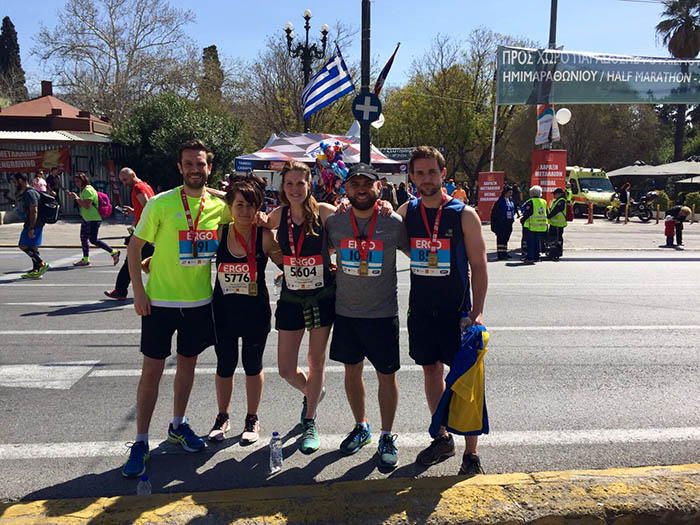
Runners in Athens: James Fox, Miriam Betz Heinemann, Vicky Baker, Dave Depares and David Heinemann
Former Index on Censorship magazine deputy editor Vicky Baker has raised £646 for Index in a race in Athens, Greece, that included running by the world-famous Acropolis.
Baker took part in the 10k run because of her interest in Index’s fellowship programme and raised three times as much as her original goal.
“Running in Athens made the race kind of different. I need sights to keep motivated. We did it around the Acropolis, but not up to the Acropolis. It was really steep, but you could see it, and there’s a bit more going on that keeps you motivated”
“It was quite hilly, but I think I was kind of aware of that, so I used to run up to Epping Forest from where I live, which is quite a hill, so that was my training programme”
She is also concerned about the lack of awareness that media freedom often receives from the public: “People tend to take free speech for granted until it’s something that you’ve lost. There are more free speech issues in our lives than we realise. There are daily stories that do have an impact on free speech that matter very much and aren’t always labelled as ‘free speech.’”
She wanted to support Index because “it’s an organisation that you can very much become involved in. It’s not a big organisation where the money you raise just goes off into the coffers alongside thousands of other donations.”
[/vc_column_text][vc_separator][vc_row_inner equal_height=”yes”][vc_column_inner width=”1/2″][vc_custom_heading text=”Support the Index Fellowship” font_container=”tag:p|font_size:20|text_align:left” use_theme_fonts=”yes” link=”url:https%3A%2F%2Fwww.indexoncensorship.org%2Fnewsite02may%2Fsupport-the-freedom-of-expression-awards%2F|||”][vc_column_text]
By donating to the Freedom of Expression Awards you help us support individuals and groups at the forefront of tackling censorship.
Find out more
[/vc_column_text][/vc_column_inner][vc_column_inner width=”1/2″][vc_single_image image=”89551″ img_size=”full” onclick=”custom_link” link=”https://www.indexoncensorship.org/newsite02may/support-the-freedom-of-expression-awards/”][/vc_column_inner][/vc_row_inner][vc_separator][vc_column_text]Baker, a journalist, added: “I have a long-standing relationship with Index because of what they do… I don’t think you ever fully leave. You certainly don’t go ‘oh well I’ve got a new job, I’m not interested in free speech anymore’.”
Baker ran with friends Dave Depares, James Fox and Index’s head of fellowship David Heinemann. They coordinated a Facebook and email campaign to raise funds for Index while Miriam Betz Heinemann ran for the refugee organisation START. The funds raised will be used to support Index’s fellowship programme.
“The fellowship was one of the things that left a big impression on me, having worked at Index. I’ve been really interested in following the stories of winners and nominees and what they do next. It’s a brilliant programme,” Baker said.
“It’s very personal because Index is such a small organisation. It enables them to form those relationships, rather than getting the people to fit into programmes that already exist, the programme kind of works around them and responds very much to what they need, and I think that’s what makes it very special,” she added.
The original fundraising goal was £200, and, at first, Baker worried that they had set the bar too high. After speaking with Index, she increased her goal: “We upped it and then people carried on sort of oblivious to what our total was, they were still supporting us.”
Baker raised three times her original fundraising goal through the support of friends, family and co-workers. “Some of my colleagues [from BBC] very kindly sponsored me too, and I think that was the aspect that appealed to them was the work that Index does protecting journalists… although we’re based in the London newsroom most of the time, obviously we’re dealing with people out in the field in much more dangerous situations,” Baker said.[/vc_column_text][/vc_column][/vc_row][vc_row][vc_column][vc_basic_grid post_type=”post” max_items=”4″ element_width=”6″ grid_id=”vc_gid:1501762788354-aaf003fc-23de-5″ taxonomies=”7902″][/vc_column][/vc_row]
20 Jul 17 | Campaigns -- Featured, media freedom featured, Statements
[vc_row][vc_column][vc_column_text]His Excellency Petro Poroshenko
President of Ukraine
11 Bankova Street
Kiev 01220
Ukraine
CC: Yuriy Stets, Minister of Information Policy
Dear President Poroshenko,
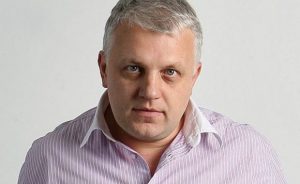
Pavel Sheremet (Photo: Ukrainska Pravda)
We are writing as active partners of the Council of Europe’s Platform to protect journalism and safety of journalists to urge you to ensure that Ukrainian investigating authorities carry out a thorough, independent, and effective investigation into the murder a year ago in Kiev of prominent Belarusian-born journalist Pavel Sheremet.
Sheremet’s killing in a car bombing in Ukraine’s capital city on July 20, 2016, cast a chill over the country’s press corps, and the ongoing impunity for those behind the crime has continued to affect journalists’ ability to cover sensitive subjects.
The current investigation by Ukrainian authorities, including the General Prosecutor’s Office (GPO), National Police, and Security Service of Ukraine (SBU), has produced no results a year after the killing, as confirmed by Committee to Protect Journalists’ recent report, Justice Denied: Ukraine comes up empty in probe of Pavel Sheremet’s murder, which CPJ launched in Kiev last week. Moreover, as CPJ confirmed during its advocacy mission that week–including in a July 11, 2017, meeting with you—authorities currently have no suspects and no leading motive for the murder.
Independent, enterprising journalists in Ukraine work under hostile conditions filled with threats, harassment, and cyberbullying in retaliation for their critical coverage of government policies and the conflict between pro-Russia separatists and Ukrainian security forces in the country’s east. A number of journalists have said they work in fear, both because of the impunity in Sheremet’s killing and authorities’ failure to recognise the importance of a critical, independent press in a democratic society.
The report on Sheremet’s murder brought into relief a number of flaws in the official investigation that need to be addressed without delay. Crucial video evidence that showcased potential suspects or key witnesses of the crime surfaced only after Ukrainian journalists—not investigators—published it. No one has publicly identified two persons seen on security camera footage apparently planting the bomb under Sheremet’s vehicle, although investigators are in possession of a clear photograph of one of the individuals.
The report also found that police and security service officials have each alleged that the other destroyed video evidence; potential witnesses and Pavel Sheremet’s colleagues say investigators have not closely questioned them; and the national police chief first tasked with leading the murder investigation resigned, citing obstruction by her superiors.
Pavel Sheremet and his former Ukrainska Pravda colleagues were under surveillance in the months before his death, but it is unclear by whom, or why. We are very concerned for their safety, especially given that it remains unclear whether the fact of the surveillance is currently being investigated.
The confirmed presence of a former SBU agent, Igor Ustimenko, near Sheremet’s apartment the very night assassins planted the bomb under his car—and the ongoing lack of clarity about the reasons and circumstances of his presence—further raise doubts about the genuineness and thoroughness of the official investigation.
The authorities were unable to provide clear answers to pressing concerns, including to such basic procedural questions as who is in charge of the investigation or why the photo of the person seen on camera footage apparently planting the bomb has not been publicly disclosed. We hope that these issues can be addressed immediately.
Press freedom concerns, including the lack of progress in Sheremet’s murder investigation, were also raised during meetings between the partners of the Council of Europe’s Platform to protect journalism and safety of journalists, and Ukrainian investigating authorities on April 4-5, 2017.
We encourage you, Mr. President, to ensure that the investigation into Sheremet’s killing examines the possibility that Ukrainian officials—former or current—may have been involved. In order to do that, we ask you to consider independent oversight of this case, which is a litmus test not only for Ukraine’s commitment to press freedom but also for its adherence to the rule of law.
We are pleased to learn that during your July 11 meeting with CPJ, you made a commitment to invite an international criminal investigator to support the Ukrainian investigation into Sheremet’s murder. We hope that discussions on this initiative will take place between Ukraine and its international partners without delay, and we encourage you to immediately contact Ukraine’s partners, including the Delegation of the European Union in Kiev, in relation to that.
Lastly, we strongly urge you to take all measures to protect the space for critical and independent journalism, including by condemning the practice of dividing journalists into patriotic and unpatriotic; and by ensuring that reporters can work freely, without fear of reprisal, and with the full protection of the state. Publicly addressing Pavel Sheremet’s colleagues at Ukrainska Pravda on the anniversary of his murder, and making a commitment to defending their safety, would be an exemplary first step toward achieving that goal.
Thank you in advance for your consideration of these urgent matters. We await your response.
Sincerely,
Article 19
Association of European Journalists (AEJ)
Committee to Protect Journalists
European Federation of Journalists (EFJ)
Index on Censorship
International Federation of Journalists (IFJ)
International Press Institute (IPI)
International News Safety Institute (INSI)
Reporters Sans Frontieres (RSF)[/vc_column_text][/vc_column][/vc_row][vc_row][vc_column][vc_separator color=”black”][vc_row_inner][vc_column_inner width=”1/2″][vc_custom_heading text=”Ukraine” font_container=”tag:p|font_size:30|text_align:left” use_theme_fonts=”yes” link=”url:https%3A%2F%2Fmappingmediafreedom.org%2F|||”][vc_column_text]Index on Censorship monitors press freedom in Ukraine and 41 other European area countries.
As of 20/07/2017, there were 284 verified reports of violations connected to Ukraine in the Mapping Media Freedom database.[/vc_column_text][/vc_column_inner][vc_column_inner width=”1/2″][vc_single_image image=”94485″ img_size=”full” onclick=”custom_link” link=”https://mappingmediafreedom.org/#/”][/vc_column_inner][/vc_row_inner][/vc_column][/vc_row]
20 Jul 17 | Campaigns, Campaigns -- Featured, Media Freedom, media freedom featured, Statements
[vc_row][vc_column][vc_column_text]Dear Mr. Désir
Index on Censorship welcomes your appointment as the Representative on Freedom of the Media by the OSCE member states. We would like to extend our congratulations to you.
Like you, we agree wholeheartedly that the role of RFoM is important. In fact it is more important today than when the office was founded 1997. Since then, the media has faced pressures from a changing financial environment and — in some nations — government interference.
Through its project Mapping Media Freedom, Index on Censorship monitors press freedom violations in 42 OSCE member states. In just the last three years, there have been 3,302 verified incidents. Sadly, the number of reports we investigate is increasing. Journalists are coming under pressure from the left and the right of the political spectrum, from governments and non-state actors, from organised crime and private citizens. These multidimensional threats demand a consistent and robust response that crosses international boundaries.
We ask that, on assuming your responsibilities, you urgently consider the following as your priorities:
- Focusing attention on how the independence of the public media in OSCE member states such as Poland and Hungary is being undermined
- Calling attention to a continent-wide drift toward tighter regulation of the media — whether online or off — in OSCE nations such as France, the UK and Germany
- Raising awareness of widespread interference with the professional duties of journalists through legal obstacles and demands for accreditation, most acutely in OSCE members Belarus, Russia and Azerbaijan
- Building on the record of the RFOM office by being a vocal and visible advocate for journalists
- Continuing a determined and consistent approach to cases of impunity
- Resisting ill-guided attempts to use legislation to further curtail the marketplace of ideas in the member states
- Call out use of terror legislation to silence media by member states
- Mount a sustained campaign against criminal defamation laws in member states
Index on Censorship stands ready to partner with you to protect the media’s right to report and the public’s right to information.[/vc_column_text][/vc_column][/vc_row][vc_row][vc_column][vc_column_text]
Mapping Media Freedom
Click on the bubbles to view reports or double-click to zoom in on specific regions. The full site can be accessed at https://mappingmediafreedom.org/[/vc_column_text][/vc_column][/vc_row]
18 Jul 17 | Digital Freedom, News and features, Qatar, Saudi Arabia
[vc_row][vc_column][vc_column_text]

Al Jazeera Broadcast Center in Doha, Qatar
A debate at the Frontline Club last night on the future of Al Jazeera and media freedom in the Middle East, following recent calls for the closure of the television network by a group of seven Arab countries led by Saudi Arabia, did not go to plan.
The original chair, BBC security correspondent Frank Gardner, pulled out of the debate and was replaced by Safa Al Ahmad, a Saudi journalist and filmmaker and the winner of the 2015 Index on Censorship Freedom of Expression Award for Journalism.
According to Arab News, sources within the BBC said Gardner’s decision was because the event was deemed “a propaganda stunt by Qatar and Al Jazeera with no attempt at balance on the panel”. In an email to Arab News, the BBC source allegedly criticised the failure “to invite anyone from the UAE, Saudi, Bahrain or Egypt onto the panel in time”.
A group of 12-15 protesters outside the Frontline Club could be heard during the debate. They chanted, among other things: “Ban Al Jazeera.” They carried Egyptian flags and signs reading: “Al Jazeera Promotes Terrorism.”
This anger was matched inside as audience members aired various grievances, including complaints about the network’s editorial line, its ties to and funding from the state of Qatar, Al Jazeera Arabic’s alleged sectarianism and anti-Shia bias and the treatment of Al Jazeera staff. Some audience members openly supported the calls to ban Al Jazeera.
“Al Jazeera is media prostitution by Qatar,” an audience member shouted at the panel, echoing a protester outside who added that the network wanted to “destroy the Middle East”.
Journalist Ben Flanagan from Arab News, an English-language newspaper published in Saudi Arabia and owned by a member of the House of Saud, put it to the panel that Al Jazeera “has been used as a platform for terrorists and extremists” and asked panelists Giles Trendle, managing director of Al Jazeera English, and Wad Khanfar, the ex-director general of Al Jazeera Media Network: “Do you feel you have blood on your hands?”
During his opening statement, Trendle said: “We are funded by the state of Qatar but we maintain an editorial independence, so there isn’t a lot of direct communication with the channel.”
Khanfar said that while Qatar “is not a charitable organisation”, “the reputation of Al Jazeera and the popularity of Al Jazeera prevented the state of Qatar from using Al Jazeera and they created a healthy distance between us at that time as an editorial newsroom and the state.”
Concerns over the treatment of staff at Al Jazeera almost certainly weren’t eased when Khanfar told Flanagan that if he worked for Khanfar at Al Jazeera he would be fired if he had any objections to interviewing a controversial figure like Osama bin Laden.
“Staff are leaving, but within any organisation there is a certain churn rate,” Trendle later added. “People come and people go.”
At one point an audience member took to the aisle, interrupted Khanfar and shouted something about Al Jazeera’s failure to report on “American involvement” in the 2012 sarin gas attack in Damascus, a conspiracy theory originated by journalist Seymour Hersh and propagated on media outlets such as Alex Jones’ Infowars.
Al Jazeera isn’t the only news outlet Saudi-led coalition’s crosshairs. The London-based Middle East Eye is also on the list. Editor David Hearst, one of last night’s panellists, clarified that the news website is independently funded. “We’re not funded by Qatar,” he said. “If Qatar rolled over, it would have absolutely no effect on us.”
Hearst believes that the reason these Arab states – including Egypt, Bahrain and the UAE – are attacking certain media organisations is that “they are really dead scared of independent criticism or examination of what’s going on,” particularly when such criticism is in Arabic. “They don’t like their own people, Arabs, reading genuinely independent news, and that is what I think started this whole thing off.”
Hearst said that the reach of Al Jazeera, which has an audience 310 million households in more than 100 countries, makes the network, in particular, a threat.
Trendle gave assurances that despite the current pressure, Al Jazeera will not be shutting its doors and remains committed to “balanced, professional” journalism. “It’s kind of business as normal in an abnormal situation,” he said.
“As journalists, we all need to stand together in solidarity against this intimidation, against this bullying. We need to stand against being censored or silenced in any way at all,” Trendle added. “We all need to stand in unison as journalists because journalism is under attack, and in recent years it’s become much clearer that it is coming under attack in a very serious way from governments as well.”
Panellist Marc Owen Jones, a professor at the Institute of Arab and Islamic Studies at Exeter University, while agreeing with Trendle, added that there needs to be a broader conversation about public service broadcasting.
“How can we have commercial media if it’s funded by weapons manufacturers? If we’re covering health case, we can’t have it funded by Big Pharma? You have to ask questions. Is it problematic to have media channels funded by non-democratic states or authoritarian states in the region if you want to really progress to another level of journalism?”
A proper debate is still to be had as Monday’s shouting match didn’t quite achieve its aim.
Index on Censorship re-iterates its position given by Index magazine editor Rachael Jolley in June: “Al Jazeera and press freedom must not be used as a bargaining chip.”[/vc_column_text][/vc_column][/vc_row][vc_row][vc_column][vc_basic_grid post_type=”post” max_items=”4″ element_width=”6″ grid_id=”vc_gid:1500396083270-89581cd9-54bd-6″ taxonomies=”449″][/vc_column][/vc_row]
18 Jul 17 | Index in the Press
Turkish authorities have arrested at least 115 people who they suspect of being involved in last year’s failed military coup and having links with the Fetullah Terrorist Organization (FETO). The suspects include journalists, midwives, academics and businessmen, according to Turkish news agency Anadolu. Read the full article
18 Jul 17 | Campaigns -- Featured, Poland, Statements
[vc_row][vc_column][vc_column_text]18 July 2017
Dear Defence Minister Macierewicz,
Reporters Without Borders (RSF), the European Centre for Press and Media Freedom (ECPMF), the European Federation of Journalists (EFJ), Freedom House, the Global Editors Network (GEN), Index on Censorship, the International Press Institute (IPI) and the South East Europe Media Organisation (SEEMO) are very concerned about the criminal proceedings you have brought through the military bureau of the Polish prosecutor-general’s office against the investigative journalist Tomasz Piatek in connection with a book he has written.
You accuse this journalist of “using force or threats against a public official” and “public insults or humiliation of a constitutional body” – charges that could result in a three-year jail sentence.
In our view, there are absolutely no grounds for prosecuting a civilian before a military court in connection with his writings.
[/vc_column_text][vc_row_inner][vc_column_inner width=”1/4″][vc_icon icon_fontawesome=”fa fa-times-circle” color=”black” background_style=”rounded” size=”xl” align=”right”][/vc_column_inner][vc_column_inner width=”3/4″][vc_column_text]
There are absolutely no grounds for prosecuting a civilian before a military court in connection with his writings.
[/vc_column_text][/vc_column_inner][/vc_row_inner][vc_column_text]The organisations signing this letter urge you to abandon these proceedings against this journalist.
We understand that Tomasz Piatek is an investigative journalist of recognised standing and that the book is based on 18 months of research and reporting.
As a prominent representative of the Polish state, using the prerogatives of your position to suppress criticism that has been levelled against you undermines the rule of law and helps to project a very damaging picture of respect for media freedom in your country. Like all other citizens, government ministers have other means at their disposal if they want to dispute allegations they regard as erroneous.
This latest attempt to intimidate a journalist seems to be part of a broader two-year-old offensive against freedoms in Poland that could be aggravated by the controversial proposed reform of the judicial system
We thank you in advance for the attention you give to our letter.
Sincerely,
Lutz Kinkel, General Director of European Centre for Press and Media Freedom (ECPMF)
Ricardo Gutiérrez,the EFJ General Secretary
Nate Schenkkan, Nations in Transit Project Director at Freedom House
Peter Bale, President of the Global Editors Network (GEN)
Melody Patry, Head of Advocacy, Index on Censorship
Scott Griffen, Director of Press Freedom Programmes at the International Press Institute (IPI)
Pauline Adès-Mével, Head of the EU-Balkan desk of Reporters Without Borders (RSF)
Oliver Vujovic, Secretary General of South East Europe Media Organisation (SEEMO)[/vc_column_text][/vc_column][/vc_row][vc_row][vc_column][vc_basic_grid post_type=”post” max_items=”12″ style=”load-more” items_per_page=”4″ element_width=”6″ grid_id=”vc_gid:1500386462977-62faa9b6-2b3f-9″ taxonomies=”6632″][/vc_column][/vc_row]
17 Jul 17 | Digital Freedom, Mapping Media Freedom, Media Freedom, media freedom featured, News and features, Ukraine
[vc_row][vc_column][vc_column_text]
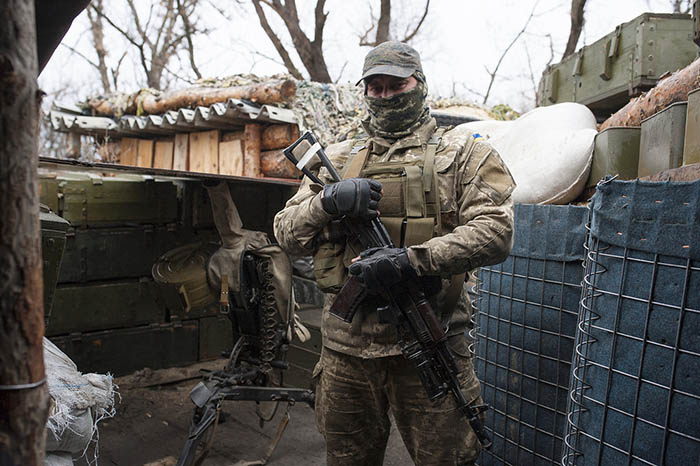
Ukrainian post control before separatist zone (Credit: Geoffrey Froment/Flickr)
Soon after the annexation of Crimea by the Russian Federation, full-scale fighting began between Ukrainian troops and separatists supported by Russia in the east of Ukraine. During active fighting in 2014, it was relatively easy for journalists to access to territories controlled by separatists.
“Accreditation was given quickly and without delay,” a Ukrainian producer who worked with international TV channels said. The producer, who requested anonymity because of ongoing work in the area, admits the risk for journalists was high because of the chaotic situation on the frontline and many of them faced detention by separatist militants. “I, like many, was detained and placed in a basement, but, fortunately, it only lasted for several hours,” he added.
Anna Nemtsova, a correspondent for Newsweek magazine and The Daily Beast, told Mapping Media Freedom that in 2014 she was abducted twice – firstly in the Luhansk region and secondly in the city of Donetsk.
“These were classic abductions,” Nemtsova said. “In Luhansk region, near Krasny Luch, armed militia wearing masks took our cell phones away from us and drove us in an unknown direction. In Donetsk, it happened near the morgue, where, according to our information, the militia had brought some of the bodies of passengers of the downed Boeing MH-17. Both detentions lasted for a few hours.”
Soon the situation with journalists’ access to uncontrolled territories would change for the worse. In February 2015, the Minsk agreements were signed and a ceasefire was established. The ceasefire agreement prompted the authorities of the two self-proclaimed republics to start monitoring journalists’ reports from the Donetsk People’s Republic and Luhansk People’s Republic.
“If they did not like the angle of coverage or some term, for example ‘separatist republics’, the name of a journalist was immediately added to the list of undesirable persons. The press service began to summon such journalists to ‘talks’ to express their dissatisfaction,” source who works as a local TV producer told MMF.
Nemtsova also faced similar difficulties. In summer 2015 she was told that the DPR press service did not like her reports and threatened to ban her, which later they said they did. “Their complaints were unreasonable, they were not about any errors in my report, but about the term ‘separatists’, which they claimed I used in my stories,” she said.
Thus, the monitoring of publications about the separatist zone in the media has led to the fact that from the summer of 2015 many journalists who tried to obtain accreditation from the self-proclaimed authorities began to receive refusals. Some reporters who managed to enter the territory of the self-proclaimed republics were detained and deported. On 16 June 2015, separatists from DPR captured Novaya Gazeta special correspondent Pavel Kanygin and handed him over to Russian security services (FSB). According to the journalist, they checked his documents and released him “in the middle of a field.”[/vc_column_text][/vc_column][/vc_row][vc_row][vc_column][vc_separator color=”black” align=”align_left”][vc_row_inner][vc_column_inner width=”1/2″][vc_custom_heading text=”Ukraine” font_container=”tag:p|font_size:24|text_align:left” use_theme_fonts=”yes” link=”url:https%3A%2F%2Fmappingmediafreedom.org%2F|||”][vc_column_text]Index on Censorship monitors press freedom in Ukraine and 41 other European area countries.
As of 17/07/2017, there were 282 verified reports of violations connected to Ukraine in the Mapping Media Freedom database.[/vc_column_text][/vc_column_inner][vc_column_inner width=”1/2″][vc_single_image image=”94239″ img_size=”full” alignment=”center” onclick=”custom_link” link=”https://mappingmediafreedom.org/”][/vc_column_inner][/vc_row_inner][vc_separator color=”black” align=”align_left”][/vc_column][/vc_row][vc_row][vc_column][vc_column_text]Over the past year, arbitrary refusals to enter the territory of the self-proclaimed republics have been quite frequent. In December 2016, Deutsche Welle’s correspondent Christian Trippe and his crew were barred from entering the territory of the self-proclaimed DPR. Journalists were trying to get to the territory controlled by DPR at a checkpoint near Marinka. Journalists had to wait an hour in a neutral zone between two fronts, while they were not allowed to return to the territory controlled by Ukrainian forces. The crew had received an authorisation from DPR press centre and had scheduled an interview with a spokesperson for the separatists. The journalists planned to visit Donetsk with Principal Deputy Chief Monitor Alexander Hug of the OSCE Special Monitoring Mission to Ukraine. However, the militants did not let them through the checkpoint with the OSCE, citing the decision of DPR special services.
In 2016, the self-proclaimed authorities continued the practice of detentions and expulsions of journalists. In November, special forces of the self-proclaimed Donetsk People’s Republic detained and expelled two journalists working for Russian TV channel Dozhd. Correspondents Sergei Polonsky and Vasiliy Yerzhenkov were detained by intelligence agencies on the evening of 25 November in Donetsk. Polonsky said that members of the self-proclaimed Ministry of State Security went to their apartment and took them to the main building of the ministry where they were interrogated. “Three employees of the Ministry of State Security were involved in the interrogation. They watched videos and deleted them. They also blocked Polonsky’s phone, broke Yerzhenkov’s phone and destroyed his notebook,” Dozhd reported. According to Dozhd, the journalists were not physically abused. “We experienced psychological abuse, but nothing more,” Polonsky said. Later, employees of the Ministry of State Security explained to the correspondents that their detention was a consequence of “false information” in the accreditation, which turned out to be a wrong phone number.
The Dozhd crew were accredited to work in Donetsk by the Security Service of Ukraine and by the Ministry of information of DPR. Journalists entered the DPR border on 24 November from Russia to interview Alexey Khodakovsky, former secretary of DPR’s Security Council. Previously, the self-proclaimed Ministry of State Security of DPR said the cause of the journalists’ expulsion was “biased” and “provocative” coverage of the situation in the DPR.
Local journalists and bloggers often find it even more risky to work in the separatist territories. In 2014, many journalists were forced to leave the territory, and are now working elsewhere in Ukraine. Over the past year, a number of arrests by separatists have been reported. The latest one is an incident with blogger and writer Stanyslav Aseev who disappeared in Donetsk. The blogger was reportedly detained by militants of the self-proclaimed DPR. Aseev uses the alias Stanislav Vasin and contributes to a number of news outlets including Radio Liberty Donbass Realities project, Ukrayinska Pravda, Ukrainian week and Dzerkalo Tyzhnya. He also runs a prominent blog via Facebook.
Donbass Realities project editor-in-chief Tetyana Jakubowicz said their contact with Aseev was lost on 2 June. That day, Aseev filed the latest report from territories held by separatists for Radio Liberty. Aseev’s relatives and friends confirmed that they also lost contact with the blogger. They questioned the self-proclaimed Ministry of Public Security of the DPR, but didn’t receive any answers. The journalist’s mother found evidence that his flat was broken into in Donetsk and noticed that some of his belongings were missing, including a laptop. On 12 July, Amnesty International reported that it learned that Aseev was being held by the de-facto “ministry of state security”.
Recently, several bloggers have been arrested in the self-proclaimed LPR. In October 2016 Vladislav Ovcharenko, a 19-year old blogger, who runs the Twitter account Luhansk Junta, was detained by separatists. Later, armed representatives of the self-proclaimed Ministry of the State Security raided his parents’ apartment, taking his mother’s computer. In December 2016, Facebook blogger Gennadiy Benytskiy was arrested in Luhansk. The blogger, who is known for his pro-Ukraine views, was accused of distributing of “extremist materials” online.
Journalists take risks even when they get accreditation from the separatist authorities. A leak by the website Myrotvorets in May 2016 led to the personal data of more than 5,000 journalists becoming available online. The link to the leak was published by some Ukrainian politicians, calling journalists who received accreditation “traitors.” Some of the journalists then received threats.[/vc_column_text][/vc_column][/vc_row][vc_row][vc_column][vc_column_text]
Mapping Media Freedom
Click on the bubbles to view reports or double-click to zoom in on specific regions. The full site can be accessed at https://mappingmediafreedom.org/[/vc_column_text][/vc_column][/vc_row]
14 Jul 17 | Azerbaijan, Digital Freedom, Mapping Media Freedom, Media Freedom, media freedom featured, News and features
[vc_row][vc_column][vc_column_text]
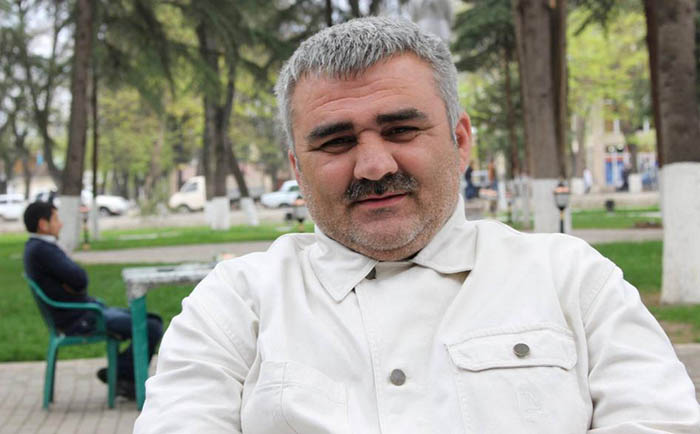
Afgan Mukhtarli. Credit: Meydan TV
Media outlets in Azerbaijan routinely deal with torture, assault, raids, imprisonment and endless intimidation, as verified reports submitted to Index on Censorship’s Mapping Media Freedom project show.
“The years-long crackdown on the independent press by the regime of Ilham Aliyev has accelerated in recent months. This is clearly one of the world’s worst environments for press freedom and, consequently, for the public’s right to information,” Hannah Machlin, project manager for Mapping Media Freedom, said.
International media freedom rankings confirm the country’s stagnating record where autocratic repression is consistent, if not the functioning political system itself. Although authorities continue to claim that the majority of the country’s 147 political prisoners are criminals, religious radicals and tax evaders, the international community of rights watchdogs view it differently. A new wave of attacks against media freedom advocates, journalists and activists within the past two months alone illustrate a place where the primacy of Ilham Aliyev, Azerbaijan’s president, and his word overrides the primacy of the words of others, particularly his critics.
One such critic, Afgan Mukhtarli, an investigative journalist, disappeared on 29 May while on his way to his home in Tbilisi. Mukhtarli reappeared the next day across the border in Azerbaijan and was accused of illegal border crossing, smuggling (police allegedly found €12,000 on him) and resisting police. He was immediately sentenced to three months in pre-trial detention.
Speaking to Mapping Media Freedom, Mukhtarli’s wife Leyla Mustafayeva said she was relieved when she heard news of his arrest because after reporting her husband missing the day before, she had assumed he was dead. However, that is the only relief Mustafayeva has had since her husband’s kidnapping:
“I have no hope for the investigations. They have been stalled. They don’t want to investigate. Police allegedly cannot find any footage. The only video that was made available to our lawyer was shown two weeks after Mukhtarli’s disappearance and it’s just of my husband getting on the bus that usually takes him home.”
Mukhtarli’s case is unique in that his is the first cross-border operation alleged to be carried out in tandem with the Georgian government. While this has yet to be confirmed by officials in Georgia, Azerbaijani lawmaker and a member of the Parliament Human Rights Committee Elman Nasirov claimed Mukhtarli’s kidnapping was “the most successful operation carried out in recent years.” Nasirov also accused Mukhtarli of being a member of a far larger anti-Azerbaijan network.
[/vc_column_text][/vc_column][/vc_row][vc_row][vc_column][vc_separator color=”black” align=”align_left”][vc_row_inner][vc_column_inner width=”1/2″][vc_custom_heading text=”Mapping Media Freedom: Azerbaijan” font_container=”tag:p|font_size:24|text_align:left” use_theme_fonts=”yes” link=”url:https%3A%2F%2Fmappingmediafreedom.org%2Fplus%2F%3Fs%3DAzerbaijan|||”][vc_column_text]Index on Censorship monitors press freedom in Azerbaijan and 41 other European area countries.
As of 14/07/2017, there were 60 verified reports of violations connected to Azerbaijan in the Mapping Media Freedom database.[/vc_column_text][/vc_column_inner][vc_column_inner width=”1/2″][vc_single_image image=”94222″ img_size=”full” alignment=”center” onclick=”custom_link” link=”https://mappingmediafreedom.org/#/”][/vc_column_inner][/vc_row_inner][vc_separator color=”black” align=”align_left”][/vc_column][/vc_row][vc_row][vc_column][vc_column_text]“Muktharli was assigned to carry out subversive activities in Azerbaijan,” Nasirov asserted, claiming that as a preventive mechanism, Azerbaijani special forces made necessary arrangements with Georgian special forces. “The are principles and rules for this. Based on security principles, this how it was made possible to bring Mukhtarli to Azerbaijan,” said Nasirov in an interview with Azadlig Radio, the Azerbaijani service for Radio Free Europe Radio Liberty.
Police have questioned political activists, members of opposition parties, and journalists as part of the investigation. Sevinc Vagifqizi, a freelance reporter, was detained while waiting for news outside the state border services where Mukhtarli was being held. Speaking to journalists after her brief detention, Vagifqizi said that police allegedly thought she was going to disturb peace outside the building. Other journalists who have been questioned in the case of Mukhtarli are investigative journalist Khadija Ismayilova, who is facing a travel ban despite her release from jail, and, more recently, Aytac Ahmadova.
The circumstances of Mukhtalri’s arrest were notably suspicious. Outside of his abduction, Mukhtarli’s lawyer was also quick to report on the injuries Mukhtarli suffered, including a broken nose, multiple bruises and possibly a broken rib. Mukhtarli is not the only journalist who appears to have been subjected to alleged police brutality. Nijat Amiraslanov, a member of the NIDA civic movement and an independent journalist based in Gazakh, reportedly lost his front teeth while serving his 30-day administrative detention. In his statement, however, Amiraslanov said his teeth fell out on their own, and that there was no ill-treatment during his detention. After Amiraslanov’s teeth fell out, the journalist refused an appeal filed by his lawyer. Amiraslanov was released on 21 June after completing the detention period.
In another show of force, police raided the office of independent online television channel Kanal 13 on 3 June, confiscating computers and other documents. Police had already detained the channel’s manager Aziz Orucov (Garashoglu) earlier in May. Orucov was sentenced to 30 days of administrative detention on the grounds of allegedly resisting police. Additional charges of illegal entrepreneurship and abuse of power were brought against Orucov on the day of his release. He was sentenced to four months in pre-trial detention.
While these men await trial, another journalist and editor-in-chief of the news website Journalistic Research Center (jam.az) Fikrat Faramazoglu was sentenced to seven years in jail on 14 June. Faramazoglu was found guilty on charges of extortion. In his defence statement, the journalist said it was his reporting on a chain of brothels that were protected by the law-enforcement agencies that incited his arrest. Faramazoglu was also banned from working as a journalist for two years following the completion of his prison term.
A classic case of revolving door policy
Rather than continue to release its political prisoners, the Azerbaijani government continues to arrest more reporters and further tightens controls on the media sector.
“There are some ten journalists and bloggers currently in prison [in Azerbaijan]. Based on these new arrests, Azerbaijan is trying to return to the list of countries where journalists critical of the government end up in jail on bogus charges,” said Muzaffar Suleymanov from the Civil Rights Defenders, a Stockholm-based rights watchdog in an interview with Mapping Media Freedom. Furthermore, a recent decision by a Baku court to block access to independent and opposition news websites broadcasting from abroad is a matter of more concern, added Suleymanov.
Levan Asatiani from Amnesty International echoed these sentiments adding that, as an international community of watchdogs, they have not seen any improvements, only a further deterioration in the human rights situation in Azerbaijan.
“While there have been releases, there have been new arrests or travel bans introduced against former prisoners of conscience,” Asatiani said. There are also legal boundaries in place that prevent the work of remaining independent civil society organisations in Azerbaijan.
It is no longer enough to make statements and express concern says Suleymanov. The Council of Europe should hold its members responsible for violating human rights while the EU must set benchmarks in accordance with the human rights situation as it negotiates a new agreement with Azerbaijan, noted Asatiani.[/vc_column_text][/vc_column][/vc_row][vc_row][vc_column][vc_basic_grid post_type=”post” max_items=”12″ style=”load-more” items_per_page=”4″ element_width=”6″ grid_id=”vc_gid:1500022088088-43842239-2fe8-0″ taxonomies=”7145″][/vc_column][/vc_row]
13 Jul 17 | News and features, Turkey
[vc_row][vc_column][vc_column_text]
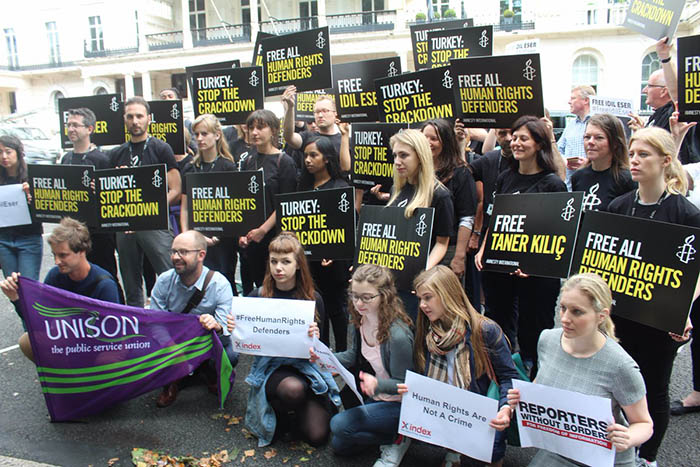
Credit: Cat Lucas, English Pen
Index on Censorship took part in a rally on 12 July at the Turkish Embassy in London to call for the release of Idil Eser, the director of Amnesty International Turkey.
Eser was detained along with seven human rights defenders and two non-Turkish trainers on 5 July while conducting a digital security and information management workshop in Büyükada, Istanbul. The protest marked the one week anniversary of their arrest.
In this special podcast, we asked representatives from Amnesty International UK, Reporters Without Borders, English Pen and Index on Censorship about the state of media freedom in Turkey and their messages for the detained human rights defenders.
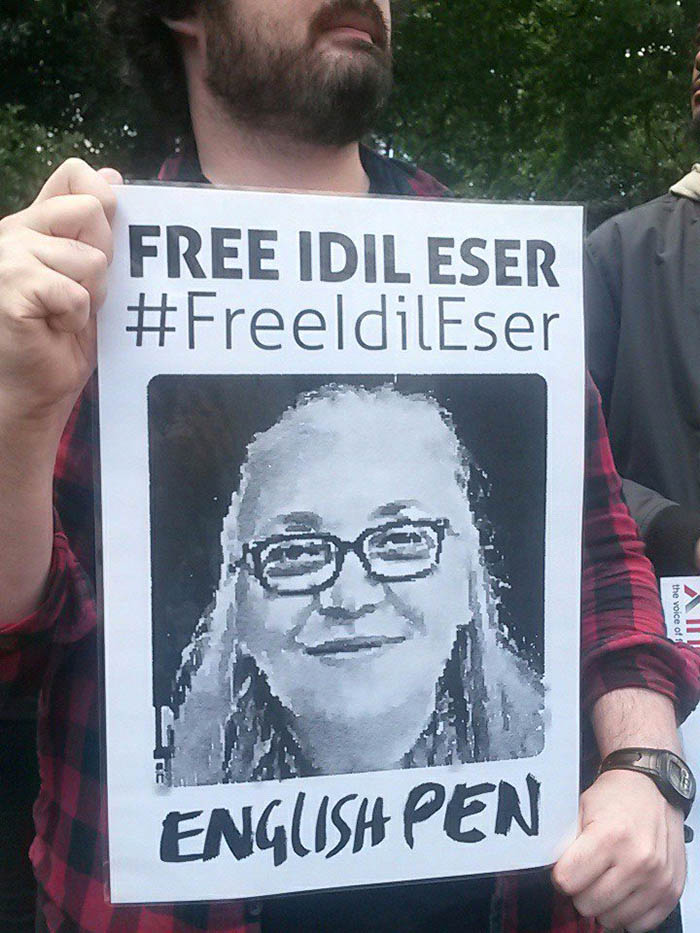
Credit: Cat Lucas, English Pen
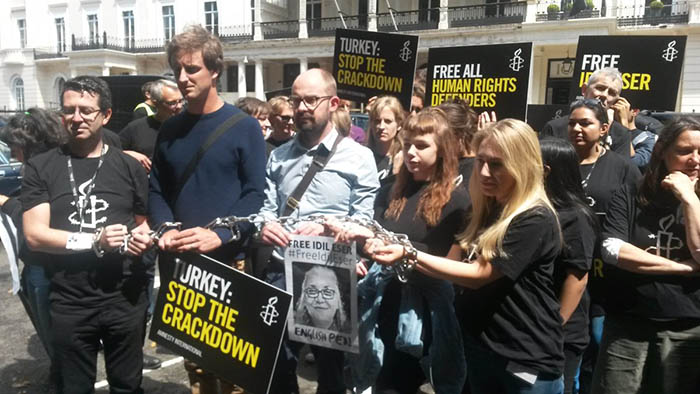
Credit: Cat Lucas, English Pen
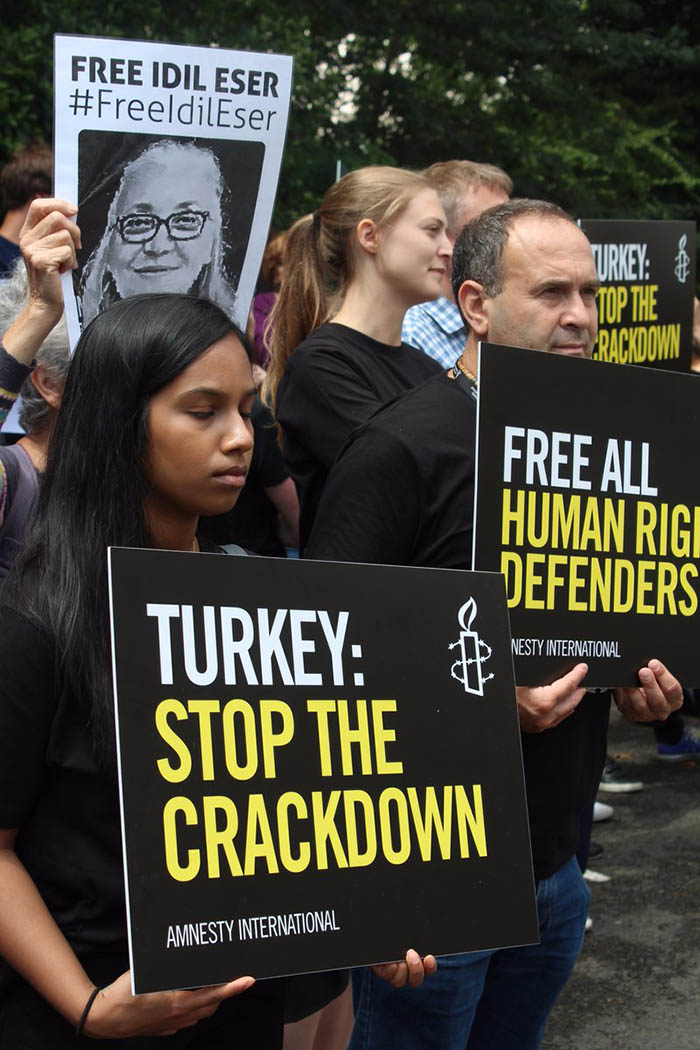
Credit: Cat Lucas, English Pen
[/vc_column_text][/vc_column][/vc_row][vc_row][vc_column][vc_basic_grid post_type=”post” max_items=”4″ element_width=”6″ grid_id=”vc_gid:1499960075571-a5ebc084-208c-2″ taxonomies=”55″][/vc_column][/vc_row]
12 Jul 17 | News and features, Volume 45.02 Summer 2016 Extras
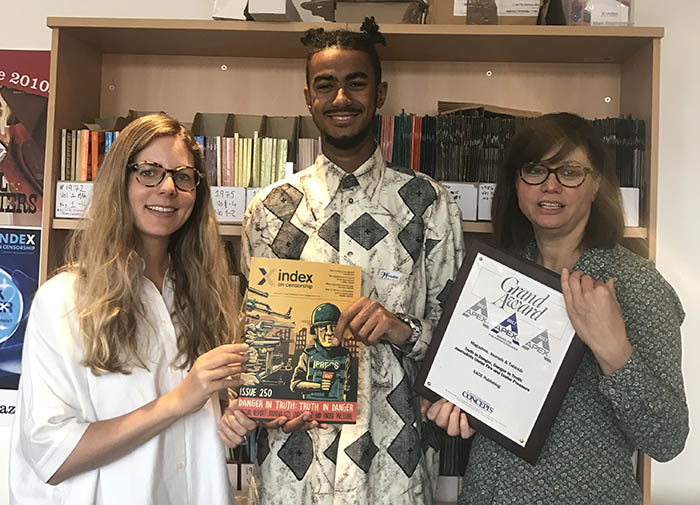
“We are very excited to hear about our APEX Award, which acknowledges the great design, and high standard of journalism here at Index on Censorship magazine,” Rachael Jolley, Index magazine’s editor, said. “There are enormous threats to freedom of expression across the world in 2017, and hopefully this award will help us bring knowledge of this to a wider audience.”
Index on Censorship magazine received a Grand Award as part of the 29th annual APEX Awards.
Judges noted that the Index magazine serves as a “vitally important and extremely relevant” resource in outlining threats to media freedoms globally.
“Dealing with such serious worldwide issues as covering war zones, protecting sources in an era of mass surveillance, life as a reporter in Syria and how journalists are dealing with accusations that they threaten national security, Index on Censorship’s 250th issue tackles these professionally and thoroughly,” judges added.
The awards are based on excellence in graphic design, editorial content and the success of the entry in achieving overall communications effectiveness and excellence. Out of 1,361 entries, 100 APEX Grand Awards were presented in 11 major categories.
12 Jul 17 | Index in the Press
More than 4,000 miles from home in Poland’s capital, President Trump couldn’t help but needle his favorite target of the week, CNN, using his catch-all derogatory moniker, “fake news.” Read the full article
11 Jul 17 | Azerbaijan, Azerbaijan Statements, Campaigns, Campaigns -- Featured, Statements
President of France, Mr. Emmanuel Macron
L’Élysée
55 Rue du Faubourg Saint-Honoré
75008 Paris, France
Ministry of Europe and Foreign Affairs of France
37, Quai d’Orsay
75351 Paris, France
Embassy of France to Azerbaijan
9, rue Rassoul Rza
AZ 1000, Baku, Azerbaijan
Subject: Support for political prisoners in Azerbaijan
11 July 2017
Dear President Macron,
We are writing to you on behalf of the undersigned organisations to draw your attention to the repressive free speech situation in Azerbaijan and to request your support to ensure the release of those imprisoned on politically motivated grounds in this country. In particular, we urge you to use your administration’s influence and leverage to help ensure the implementation of the ruling issued by the European Court of Human Rights (ECtHR) on the case of political opposition activist Ilgar Mammadov. He remains in prison, although the Court concluded that he was detained in retaliation for his criticism of the government. The persistent non-execution of the ruling in his case by the Azerbaijani authorities is undermining the credibility of the human rights protection regime established by the Council of Europe and sets a dangerous precedent for all those wrongfully prosecuted in Azerbaijan who turn to the Court in search of justice.
In view of France’s role as a leading European state and host country for the ECtHR and other Council of Europe bodies, as well as its well-developed cooperation with Azerbaijan in trade and other areas, your engagement on this issue would be particularly important. We welcome the moral, value-based and human rights oriented leadership that you have embraced for your presidency and are confident that you will vigorously pursue human rights in relations with Azerbaijan’s government on the basis of the common standards set out in the European Convention on Human Rights.
In the last few years, Azerbaijan’s government has carried out a relentless crackdown on alternative voices in the country. Legislation seriously restricting the operation of NGOs has been enforced, independent media subjected to pressure, the political opposition has been marginalised and human rights defenders, journalists and political opposition activists have been arrested, convicted and imprisoned on politically motivated charges.
While some of those imprisoned on such grounds have been released as a result of international pressure, new arrests continue to take place. For example, well-known blogger Mehman Huseynov was arrested and sentenced to two years in prison on defamation charges in March this year after speaking out about police ill-treatment. Journalist Aziz Orujov and opposition member Gozel Bayramli were arrested on other spurious charges in May, while in the same month journalist Afgan Mukhtarli was abducted in Georgia only to resurface in Azerbaijani custody. Many government critics imprisoned in previous years also remain behind bars, including Ilgar Mammadov.
Ilgar Mammadov, who chaired the political opposition REAL party and served as director of the Council of Europe School of Political Studies in Azerbaijan, was detained in February 2013 after monitoring and reporting on street protests in the town of Ismayilli, which resulted in clashes with the police. He was groundlessly accused of instigating these clashes and sentenced to seven years in prison on trumped-up charges of organising mass riots and using violence against police. In a judgment issued in May 2014, the ECtHR found that Ilgar Mammadov’s arrest and detention violated his rights to liberty and security, judicial review of his detention and to be presumed innocent under the European Convention on Human Rights. The court also found that Azerbaijan’s government had imposed restrictions on his rights for purposes other than those permitted, in violation of its obligations under the Convention. The court concluded that Mammadov was detained on political rather than legal grounds for the purpose of punishing and silencing him for his criticism of the government.
It has now been more than three years since the ECtHR adopted its judgement in this case, but the Azerbaijani authorities have consistently failed to implement it, although Azerbaijan is legally bound to comply with ECtHR rulings as a party to the European Convention on Human Rights. The Azerbaijani authorities have ignored repeated calls by other Council of Europe bodies, including its Committee of Ministers – which supervises the implementation of court rulings, its Secretary General and its Human Rights Commissioner to execute the judgment on Mammadov’s case. In November 2016, Azerbaijan’s Supreme Court rejected an appeal submitted by Mammadov on the basis of the ECtHR ruling and upheld his seven- year prison sentence. As a result, he continues to be unlawfully imprisoned.
To date the case of Ilgar Mammadov is the only one where the relevant authorities have failed to implement an ECtHR ruling that has found that the detention of an individual violates the right to liberty and security under the European Convention on Human Rights. As emphasized in a joint statement issued by 44 members of the Civic Solidarity Platform and the Sport for Rights Coalition in May 2017, the non-implementation of the ECtHR’s judgment on this case has developed into a test of the legitimacy of the Council of Europe as the guardian of human rights and the rule of law in the region. Thus, this case is no longer only about the unlawful deprivation of liberty of Ilgar Mammadov. On the contrary, it has become a case that risks weakening the effectiveness of the entire human rights protection regime established by the Council of Europe, as well as eroding confidence in this regime among people in Azerbaijan and other member states who turn to the ECtHR when their rights are being trampled upon by their governments.
We urge you to do all in your power to help prevent this dangerous outcome and to ensure the implementation of the ECtHR judgment in the case of Ilgar Mammadov, as well as the release of him and others arbitrarily detained on politically motivated grounds in Azerbaijan. To this end, we urge you in particular to:
- Support the civil society appeal to the Committee of Ministers of the Council of Europe to refer the case of Ilgar Mammadov back to the ECtHR on the grounds of non-execution of the judgment under article 46.4 of the European Convention on Human Rights, which sets out a mechanism in cases where parties to the convention refuse to abide by a final
- Issue a public statement on the importance of the execution of ECtHR judgments in view of the integrity and credibility of the human rights protection regime established by the Council of Europe, giving particular attention to the failure by the Azerbaijani authorities to date to implement the ruling on the case of Ilgar Mammadov and the wider implications of
- Prominently raise the case of Ilgar Mammadov and others who have been deprived of their liberty in retaliation for their exercise of fundamental freedoms in Azerbaijan, including Mehman Huseynov, Aziz Orujov, Gozel Bayramli and Afgan Mukhtarli in relations with the Azerbaijani authorities and use all available means of leverage to press for their
- Invite representatives of Azerbaijani civil society to a meeting to demonstrate support with them and to discuss the challenges they face and ways in which your administration can help address these challenges and promote improved respect for the standards protecting fundamental freedoms set out in the European Convention on Human
We thank you for your consideration of the issues raised in this letter and would be happy to provide additional information should you so request.
Sincerely,
- Association UMDPL (Ukraine)
- Bir Duino (Kyrgyzstan)
- Canadian Journalist for Free Expression (Canada)
- Center for Civil Liberties (Ukraine)
- Center for Participation and Development (Georgia)
- Centre for the Development of Democracy and Human Rights (Russia)
- Crude Accountability (USA)
- Eastern Partnership Civil Society Forum
- Fair Trails (UK)
- Freedom Files (Poland/Russia)
- Freedom Now (USA)
- German-Russian Exchange (DRA – Germany)
- Helsinki Committee for Human Rights (Serbia)
- Helsinki Foundation for Human Rights (Poland)
- Human Rights Matter (Germany)
- Human Rights Watch (USA)
- Index on Censorship (UK)
- International Partnership for Human Rights (Belgium)
- Kazakhstan International Bureau for Human Rights and the Rule (Kazakhstan)
- Legal Policy Research Center (Kazakhstan)
- Legal Transformation Center (Belarus)
- Libereco – Partnership for Human Rights (Germany/Switzerland)
- Moscow Helsinki Group (Russia)
- Norwegian Helsinki Committee (Norway)
- PEN America (USA)
- People in Need (Czech Republic)
- Public Association “Dignity” (Kazakhstan)
- Public Verdict Foundation (Russia)
- Regional Center for Strategic Studies (Azerbaijan)
- The Barys Zvozskau Belarusian Human Rights House (Belarus)
- The Kosova Rehabilitation Centre for Torture Victims (Kosovo)
- Truth Hounds (Ukraine)
- World Organisation against Torture (OMCT)
Human rights defenders from Azerbaijan who have signed the letter:
- Akif Gurbanov, Institute for Democratic Initiatives
- Alasgar Mammadli, lawyer
- Anar Mammadli, Election Monitoring and Democracy Training Center
- Annagi Hajibayli, Azerbaijan Lawyers Association
- Asabali Mustafayev, lawyer
- Bashir Suleymanli, Civil Rights Institute
- Intiqam Aliyev, Legal Education Society
- Khadija Ismayilova, human rights defender, investigative journalist
- Latafat Malikova, Regional Human Rights and Education Public Union
- Rasul Jafarov, Human Rights Club
- Samir Kazimli, human rights defender
- Xalid Bagirov, human rights defender, lawyer
- Zohrab Ismayıl, Public Association for Assistance to Free Economy











